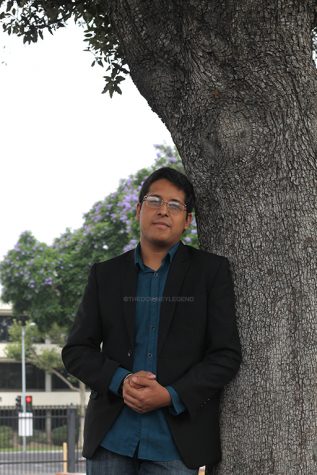Anyone Can Wear the Mask
February 1, 2019
Since his inception in 1962, Spider-Man has been an exercise in the universality of storytelling. Peter Parker is still the one superhero in the paradigm of comics that exemplifies the commonality of man. Living in Queens, New York and going to high school (or college depending on the series), Peter lives a simple life as a teenager fumbling through life, just trying to juggle his responsibilities as both a student and superhero.
Peter’s appeal lies in his ability to be fearlessly confident, yet earnestly vulnerable; he may have super-powered abilities that surpass what is possible, but deep down he is human and acts according to that fact. But while this holds true, it is the discovery of identity and trust in oneself that makes Spider-Man universal, and Spider-Man: Into the Spider-Verse encapsulates why audiences, myself included, have connected with the character for so long, no matter who is underneath the mask.
Miles Morales is just a kid. Going into the movie, Miles wants to find a place for himself amidst the expectations his family, teachers, and the eccentric and varied members of the Spider-Verse have of him. He fights an internal battle between forging his own path as Spider-Man and following the path of his counterparts, with the source of his anxiety and hesitation stemming from disappointing those closest to him. Already struggling to fit in to his new private school, Visions Academy, he longs to be back in his past middle school where he could be free and express himself without judgement from any collective group. It is this type of peer pressure that sends him spiraling, but also jump-starts his journey to follow in Peter Parker’s footsteps.
Throughout the runtime of Spider-Man: Into the Spider-Verse, the audience sees Miles grow into his own unique version of Spider-Man without relying on the other iterations. He finds the potential to be greater when he realizes that there is no escape from the responsibility he has undertaken – he needs to help the other members of the Spider-Verse get home to their own dimensions. But before he could help his friends, he had to take a leap of faith.
Watching the scene where Miles forces himself to jump off a building and swing is an ethereal experience because he represents anyone who has ever felt lost. Anyone who has ever felt scared to face the unknown out of fear that they will fail themselves and the people relying on them. It is poetic seeing Miles rise to a position he was afraid of undertaking and succeeding in his position. This is made more poignant since it comes at a time when he is struggling to find who he is, yet in the end he focuses on the one expectation that really matters: the one he has for himself.
In the end, Miles learns to trust his abilities, and that is the key aspect to understand about Spider-Man. He is not completely fearless, nor does he cower in fear. Putting on the mask is an act of trust; it is believing in one’s ability to help those around them. It is believing that the world is accepting of whoever one chooses to be. Above all, putting on the mask is believing that no matter how large the fall, the rise that follows will always be higher.



